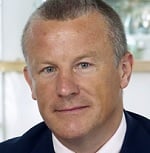 |
| GSK CEO Andrew Witty |
GlaxoSmithKline's cardio group has another flop on its hands. More than a year after its second big Phase III program for darapladib also turned out to be a bust, the pharma giant is reporting today that losmapimod--cited by CEO Andrew Witty as a top late-stage program--failed to measure up in the first leg of a clinical marathon. And it's not planning to fund step two.
When Glaxo ($GSK) mapped out its development plan for LATITUDE-TIMI 60, investigators had been planning to test the drug in some 25,000 patients, a characteristic of big cardio studies. But their drug, a p38 inhibitor designed to tamp down on an enzyme associated with acute inflammation and cell damage, couldn't survive an interim review among a cohort of 3,503 patients.
Not all the news from GSK today was bad, though. The company reported that its shingles vaccine, Shingrix, had passed a late-stage test among patients 70 and older, reinforcing positive data among younger patients and clearing the way for regulatory filings.
 |
| Neil Woodford |
The cardio failure comes as the U.K. company is facing a round of press reports that influential fund manager and GSK investor Neil Woodford is pressing the chairman to break up the company into four separate divisions. Glaxo has been grappling with steadily eroding numbers as generic competition lines up against Advair. An asset swap with Novartis ($NVS), trading cancer drugs and its late-stage oncology pipeline for low-margin vaccines, failed to ignite much if any enthusiasm for the company's future. And analysts have been left wondering how Witty can turn things around with the game plan in hand.
Losmapimod's results won't help matters.
Researchers say the drug was failing on the primary endpoint, then pointed to a subgroup of patients classified with ST elevation myocardial infarction (STEMI) who may have benefited. Again, the data were not statistically significant, but the company spotlighted indications of efficacy against "pre-specified endpoints of cardiovascular death, hospitalization for heart failure, and the composite of the two were observed."
GSK's cardio group has a bad habit of touting signs of success, with top researchers insisting well into the troubled Phase III game for darapladib that they were pursuing clear signs of efficacy.